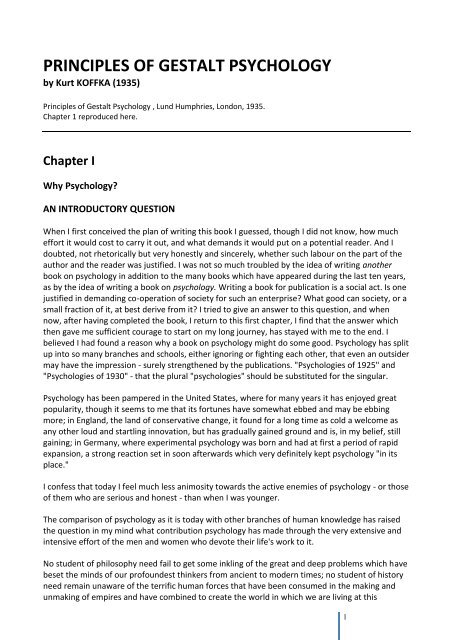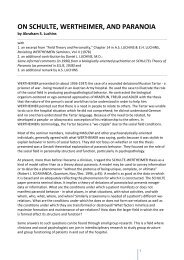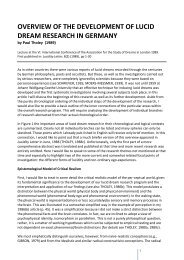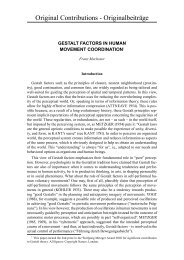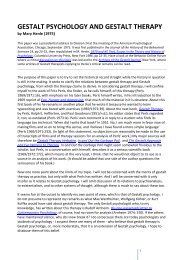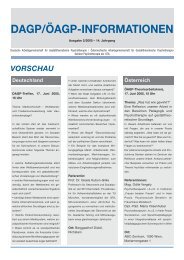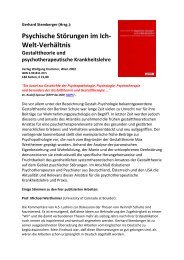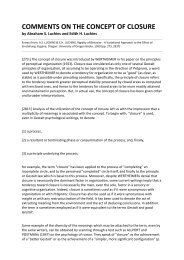Principles of Gestalt Psychology - Society for Gestalt Theory and its ...
Principles of Gestalt Psychology - Society for Gestalt Theory and its ...
Principles of Gestalt Psychology - Society for Gestalt Theory and its ...
Create successful ePaper yourself
Turn your PDF publications into a flip-book with our unique Google optimized e-Paper software.
A science, there<strong>for</strong>e, gains in value <strong>and</strong> significance not by the number <strong>of</strong> individual facts it collectsbut by the generality <strong>and</strong> power <strong>of</strong> <strong>its</strong> theories, a conclusion which is the very opposite <strong>of</strong> thestatement from which our discussion started. Such a view, how. ever, does not look down uponfacts, <strong>for</strong> theories are theories <strong>of</strong> facts <strong>and</strong> can be tested only by facts, they are not idlespeculations <strong>of</strong> what might be, but theoriai, i.e., surveys, intuitions, <strong>of</strong> what is. There<strong>for</strong>e in mypresentation <strong>of</strong> psychology I shall emphasise the theoretical aspect; many facts will be reported,but not as a mere collection, or an exhibition <strong>of</strong> curious phenomena to be compared to Mme.Tussaud's waxworks, but as facts in a system - as far as it is humanly possible not a pet system <strong>of</strong>my own, but the system to which they intrinsically belong, i.e., as rationally underst<strong>and</strong>able facts.SCIENCE AS DISCIPLINESuch a procedure would, however, be without value if it neglected another aspect <strong>of</strong> science, s<strong>of</strong>ar omitted from our discussion, viz., the greatest possible exactness in the establishment <strong>of</strong> facts.By <strong>its</strong> dem<strong>and</strong> <strong>for</strong> exactness science frees <strong>its</strong>elf from the personal wishes <strong>of</strong> the scientist. A theorymust be dem<strong>and</strong>ed by facts; in <strong>its</strong> turn it dem<strong>and</strong>s facts, <strong>and</strong> if they fail to con<strong>for</strong>m exactly to it,then the theory is either wrong or incomplete. In this sense science is discipline. We cannot dowhat we want, but must do what the facts dem<strong>and</strong>. The success <strong>of</strong> science has tended to make usproud <strong>and</strong> conceited. But such conceit is out <strong>of</strong> place. He is the greatest master who is thegreatest servant. Again <strong>and</strong> again we experience in the progress <strong>of</strong> knowledge how apt we are tohalt <strong>and</strong> stumble, again <strong>and</strong> again we find how little we can make knowledge, how we must giveour thoughts time to grow. There<strong>for</strong>e the pursuit <strong>of</strong> knowledge, instead <strong>of</strong> making us proud <strong>and</strong>boastful, should make us modest <strong>and</strong> humble.FUNCTION OF SCIENCETo ' summarise: the acquisition <strong>of</strong> true knowledge should help us to reintegrate our world whichhas fallen to pieces; it should teach us the cogency <strong>of</strong> objective relations, independent <strong>of</strong> ourwishes <strong>and</strong> prejudices, <strong>and</strong> it should indicate to us our true position in our world <strong>and</strong> give usrespect <strong>and</strong> reverence <strong>for</strong> the things animate <strong>and</strong> inanimate around us.SPECIAL FUNCTION OF PSYCHOLOGYThis is true <strong>of</strong> all sciences. What special claim can psychology make? To teach us humility, whatscience can do that better than astronomy <strong>and</strong> astrophysics which deal with times <strong>and</strong> distancesfar beyond the scope <strong>of</strong> our imagination? And what science can discipline us better than puremathematics with <strong>its</strong> dem<strong>and</strong>s <strong>for</strong> absolute pro<strong>of</strong>s? Could we then claim that psychology isparticularly fitted <strong>for</strong> the task <strong>of</strong> integration, <strong>and</strong> give this as an answer to the question from which- we started? I think we can, <strong>for</strong> in psychology we are at the point where the three great provinces<strong>of</strong> our world intersect, the provinces which we call inanimate nature, life, <strong>and</strong> mind.NATURE, LIFE, MIND<strong>Psychology</strong> deals with the behaviour <strong>of</strong> living beings. There<strong>for</strong>e, as every biological science, it isfaced with the problem <strong>of</strong> the relation between animate <strong>and</strong> inanimate nature whether it is aware<strong>of</strong> <strong>and</strong> concerned with this problem or not. But to the psychologist, one special aspect <strong>of</strong>behaviour, in ordinary parlance called the mental, assumes paramount importance. This is not theplace to discuss consciousness <strong>and</strong> mind as such. Later chapters will show the use we make <strong>of</strong>these concepts. But we will not reject at the outset a distinction which permeates our idiomatic5
speech as much as our scientific terminology. We all underst<strong>and</strong> what is meant by the propositionthat a prize-fighter was knocked out <strong>and</strong> did not recover consciousness <strong>for</strong> six minutes. We knowthat during these fatal six minutes the pugilist did not cease to live, but that he lost one particularaspect <strong>of</strong> behaviour, Furthermore we know that consciousness in general <strong>and</strong> each specificconscious function in particular, is closely bound up with processes in our central nervous system.Thus the central nervous system becomes, as it were, the nodal point where mind, life, <strong>and</strong>inanimate nature converge. We can investigate the chemical constitution <strong>of</strong> the nervous tissue<strong>and</strong> will find no component that we have not found in inorganic nature; we can study the function<strong>of</strong> this tissue <strong>and</strong> will find that it has all the characteristics <strong>of</strong> living tissue; <strong>and</strong> finally there is thisrelation between the life function <strong>of</strong> the nervous system <strong>and</strong> consciousness.Two Types <strong>of</strong> Solutions <strong>of</strong> the Problems Involved in This Relation Rejected.Anybody who would claim to have found a complete <strong>and</strong> true solution <strong>of</strong> our problems wouldexpose himself to the just suspicion <strong>of</strong> being either an ass or a quack. These problems haveoccupied the best human minds <strong>for</strong> thous<strong>and</strong>s <strong>of</strong> years, <strong>and</strong> there<strong>for</strong>e it is more than unlikely thata solution can be found by any, other way than a slow <strong>and</strong> gradual approach. What I think aboutthe mode <strong>of</strong> this approach I shall again defer to a later part <strong>of</strong> the book.Materialism.But here I shall reject two types <strong>of</strong> solutions that have been <strong>of</strong>fered. The first is the solution <strong>of</strong>crude materialism, which gained great momentum about the middle <strong>of</strong> the last century <strong>and</strong> found<strong>its</strong> most popular expression in a book that around 1900 was a best-seller <strong>and</strong> is now practically<strong>for</strong>gotten. I mean Haeckel's Riddle <strong>of</strong> the Universe. I am not sure that the United States are noteven now feeling the last ebbing wave <strong>of</strong> this flood which reached the shores <strong>of</strong> the New Worldlong after <strong>its</strong> crest had passed from the Old. This materialistic solution is astonishingly simple. Itsays: The whole problem is illusory. There are no three kinds <strong>of</strong> substance or modes <strong>of</strong> existence,matter, life, <strong>and</strong> mind; there is only one, <strong>and</strong> that is matter, composed <strong>of</strong> blindly whirling atomswhich, because <strong>of</strong> their great numbers <strong>and</strong> the long time at their disposal, <strong>for</strong>m all sorts <strong>of</strong>combinations, <strong>and</strong> among them those we call animals <strong>and</strong> human beings. Thinking <strong>and</strong> feeling,why, they are just movements <strong>of</strong> atoms. Interfere with the matter <strong>of</strong> the brain <strong>and</strong> see whatremains <strong>of</strong> consciousness. Although I have expressed this view very crudely, I believe that I haveexpressed it adequately, particularly when I add that this view is not only a scientific conviction,but as well, or even more so, a creed <strong>and</strong> a wish. It is the revolt <strong>of</strong> a generation that saw a stronglyentrenched church hold on to dogmas which science, growing up like a young giant, had crushed -a generation that, by the successful applications <strong>of</strong> science to technical problems, had becomevainglorious <strong>and</strong> had lost that feeling <strong>of</strong> awe which should accompany all true knowledge. just asthe victorious barbarians, be they v<strong>and</strong>als or Calvinists, destroyed thoroughly <strong>and</strong> passionately thecreations most dear to their vanquished enemies, so our materialists developed a hatred <strong>of</strong> thoseparts <strong>of</strong> human philosophy that pointed beyond the pale <strong>of</strong> their narrow conceptions. To be calleda philosopher was an insult, <strong>and</strong> to be a believer was to belong among the untouchables.Now I bear no grudge against these men, much as I see their narrow-mindedness <strong>and</strong> theirsmallness <strong>of</strong> stature. For I believe that malgré tout they have served a good purpose. They havehelped to build up an intelligentsia strong enough to st<strong>and</strong> out against the unwarrantedinterference <strong>of</strong> a reactionary church <strong>and</strong> pursue their own way, bringing up a new generationwhich was unhampered by theological restrictions <strong>and</strong> there<strong>for</strong>e had no axe to grind.6
As to materialism <strong>its</strong>elf, it is not necessary today to refute it. I will add only this: the materialist'sclaim that the problems <strong>of</strong> relationship or interaction between matter, life, <strong>and</strong> mind were falselyput may turn out to be perfectly valid. The hopeless error which the materialists committed was tomake an arbitrary discrimination between these three concepts with regard to their scientificdignity. They accepted one <strong>and</strong> rejected the two others - their excuse being the intrinsic <strong>and</strong>extrinsic success <strong>of</strong> science <strong>and</strong> the absurdities <strong>of</strong> the contemporary speculative philosophy -whereas each <strong>of</strong> them may, as a conception, contain as much <strong>of</strong> the ultimate truth as the others,quite apart from the stage <strong>of</strong> development which each <strong>of</strong> them may have reached at a given time.Vitalism, Spiritualism.The other type <strong>of</strong> solution which I want to reject here does not deny the validity <strong>of</strong> our problems;rather it attempts to solve them by establishing two or three separate realms <strong>of</strong> existence, eachsharply distinguished from the other by the presence or absence <strong>of</strong> a specific factor. One c<strong>and</strong>iscriminate three such attempts; the first draws the dividing line between life <strong>and</strong> mind, life <strong>and</strong>inanimate nature belonging together (Descartes), <strong>and</strong> mind, a new <strong>and</strong> divine substance,separating man from the rest <strong>of</strong> creation. The second, on the other h<strong>and</strong>, throws life <strong>and</strong> mindtogether as directed by a power not found in inorganic nature <strong>and</strong> there<strong>for</strong>e essentially differentfrom it (vitalism). The third sticks to the threefold division <strong>and</strong> looks <strong>for</strong> special active principles ineach <strong>of</strong> the three realms (Scheler). Of these three, vitalism has gained by far the greatestimportance because many thorough <strong>and</strong> highly ingenious attempts have been made to establish itas a truly scientific theory. The problem <strong>of</strong> vitalism will there<strong>for</strong>e occupy us repeatedly in thefollowing pages. Here I only explain why I must reject this whole type <strong>of</strong> explanation at the outset.The answer is simple enough, but will, without a wider context, appear somewhat unsatisfactory.The vitalistic type <strong>of</strong> solution is no solution, but a mere renaming <strong>of</strong> the problem. By renaming it, itemphasises the problem, <strong>and</strong> is, in that respect, much superior to crude materialism. But bypretending that a new name is a solution, it might do a great deal <strong>of</strong> harm to science were itwidely accepted. Characteristically, however, vitalism, not to mention the two other <strong>for</strong>ms <strong>of</strong> ourtype, has never been popular among scientists, particularly not among those nearest concerned,the biologists. It required always a full share <strong>of</strong> personal courage to pr<strong>of</strong>ess oneself a vitalist, <strong>and</strong>there<strong>for</strong>e let us honour the men who were willing to sacrifice their reputations <strong>and</strong> their careers inthe service <strong>of</strong> a cause which they considered to be a true one.Integration <strong>of</strong> Quantity, Order, <strong>and</strong> Meaning.By rejecting these types <strong>of</strong> solution I have implied the kind <strong>of</strong> solution our psychology 'II have to<strong>of</strong>fer. It cannot ignore the mind-body <strong>and</strong> the life-nature problem, neither can it accept thesethree realms <strong>of</strong> being as separated from each other by impassable chasms. It is here that theintegrative quality <strong>of</strong> our psychology will become manifest. Materialism tried to achieve a simplesystem by using <strong>for</strong> <strong>its</strong> interpretation <strong>of</strong> the whole the contribution <strong>of</strong> one part. To be trulyintegrative, we must try to use the contributions <strong>of</strong> every part <strong>for</strong> the building <strong>of</strong> our system.Looking at the sciences <strong>of</strong> Nature, Life, <strong>and</strong> Mind, we may extract from each one specific <strong>and</strong>particularly important concept, viz., from the first: quantity, from the second: order, <strong>and</strong> from thethird: meaning or significance (in German: Sinn). Our psychology, then, must have a place <strong>for</strong> all <strong>of</strong>these. Let us discuss them one by one.QUANTITY AND QUALITY.7
Modern scientific psychology was started by quantification. Mental functions were shown to beexpressible in purely quantitative terms (Weber's Law), <strong>and</strong> ever since then the quantitativeinterest has done as much harm as good to the further development <strong>of</strong> our science. On the oneside, we find those who want to measure everything, sensations, emotions, intelligence; <strong>and</strong> onthe other, those who deny that true psychological problems are amenable to quantitativetreatment; to them, psychology is the domain <strong>of</strong> quality, excluding quantity. In my opinion thisfamous antithesis <strong>of</strong> quantity <strong>and</strong> quality is not a true antithesis at all. It owes <strong>its</strong> popularity largelyto a regrettable ignorance <strong>of</strong> the essence <strong>of</strong> quantity as used in physical science.Modern science, it is true, begins with quantitative measurement. The present-day physicistdevotes the greatest ef<strong>for</strong>ts to making his measurements finer <strong>and</strong> finer; but he will not measureanything <strong>and</strong> everything, but only such effects as in some way or other contribute to his theory. Itis impossible to discuss here all the functions <strong>of</strong> quantitative measurement in physics. But it is fairto say that a mere collection <strong>of</strong> numbers is never what the physicist wants. What he is frequentlyinterested in is the distribution <strong>of</strong> measurable characteristics in a given volume <strong>and</strong> the changeswhich such distributions undergo. Both types <strong>of</strong> facts he describes by means mathematicalequations which may contain a few concrete numbers but in which abstract numbers are by farthe most important constituents. And the mathematical <strong>for</strong>mula establishes primarily a definiterelationship between these abstract numbers. Measurement has then the role to test the validity<strong>of</strong> the equation <strong>for</strong> the process which it is meant to describe, i.e., <strong>of</strong> the relationship established.Such a relationship, however, is no longer quantitative in the simple sense in which any oneconcrete number is; <strong>its</strong> quantity is no longer opposed to quality. The misunderst<strong>and</strong>ing ariseswhen one considers only the individual facts with their measured quantities, overlooking themanner <strong>of</strong> their distribution. But the latter is no less factual than the <strong>for</strong>mer, <strong>and</strong> it indicates aproperty or quality <strong>of</strong> the condition or process under discussion. A simple example should clarifythis point: In a soap bubble the <strong>for</strong>ces <strong>of</strong> cohesion between the soap particles pull them as closetogether as possible. They are held in equilibrium by the air enclosed by the soap membrane,whose pressure would increase if the bubble contracted. The soap, there<strong>for</strong>e, must remaindistributed over the outside boundary <strong>of</strong> an air volume, <strong>and</strong> the distribution will be such that it willoccupy as little space as possible. Since <strong>of</strong> all solids the sphere is the one which has the greatestvolume <strong>for</strong> a given surface or the smallest surface <strong>for</strong> a given volume, the soap will distribute <strong>its</strong>elfon a spherical surface. A statement like this seems to me to be as much qualitative as quantitative;the latter, because it says <strong>of</strong> each particle that it is here <strong>and</strong> not somewhere else; the <strong>for</strong>mer,because it assigns a definite shape with all <strong>its</strong> peculiarities to our distribution. Once our attentionhas been drawn to this point we shall find it difficult in a great many cases to decide whether astatement is quantitative or qualitative. A body moves with constant velocity; truly quantitative,but equally truly qualitative, <strong>and</strong> the same is true whatever kind <strong>of</strong> velocity we attribute to thebody. Thus when the velocity varies with the sine or cosine <strong>of</strong> time, the body executes a periodicmovement which is qualitatively quite different from a mere translatory movement.We conclude from these examples: the quantitative, mathematical description <strong>of</strong> physical science,far from being opposed to quality, is but a particularly accurate way <strong>of</strong> representing quality. I will,without pro<strong>of</strong>, add that a description may be quantitative without being at the same time themost adequate one. Of the two analytic equations <strong>of</strong> the circle: x' + y' = r', <strong>and</strong> r = constant, thesecond expresses the specific quality Of the circle more directly <strong>and</strong> hence more adequately thanthe first.And we can now draw a lesson <strong>for</strong> our psychology: it may be perfectly quantitative without losing<strong>its</strong> character as a qualitative science, <strong>and</strong> on the other h<strong>and</strong>, <strong>and</strong> at the present moment even8
more important, it may be unblushingly qualitative, knowing that if <strong>its</strong> qualitative descriptions arecorrect, it will some time be possible to translate them into quantitative terms.ORDER.Let us now turn to "order," the concept derived from the sciences <strong>of</strong> life. Can we give asatisfactory definition <strong>of</strong> this concept? We speak <strong>of</strong> an orderly arrangement <strong>of</strong> objects when everyobject is in a place which is determined by <strong>its</strong> relation to all others. Thus the arrangement <strong>of</strong>objects thrown at r<strong>and</strong>om into a lumber room is not orderly, while that <strong>of</strong> our drawing roomfurniture is. Similarly we speak <strong>of</strong> an orderly march <strong>of</strong> events (Head) when each part event occursat <strong>its</strong> particular time, in <strong>its</strong> particular place, <strong>and</strong> in <strong>its</strong> particular way, because all the other partevents occur at their particular times, in their particular places, <strong>and</strong> in their particular ways. Anorderly march <strong>of</strong> events is, e.g., the movement <strong>of</strong> the piano keys when a. practised player plays atune; a mere sequence <strong>of</strong> events without any order takes place when the keys are pressed downby a dog running over the keyboard."ORDER NOT AN OBJECTIVE CATEGORY."Both examples may give rise to a particular objection or may lead to a special theory <strong>of</strong> order. Letus take up the objection first: "Why," so an opponent, whom <strong>for</strong> the sake <strong>of</strong> convenience we shallcall Mr. P, might ask, "do you call the motions <strong>of</strong> the piano keys in the second case less orderlythan the first? I can," so he continues, "find only one reason, <strong>and</strong> that is that you like the firstbetter than the second. But this subjective feeling <strong>of</strong> preference is surely not a. sufficient reason<strong>for</strong> introducing a distinction allegedly fundamental, <strong>and</strong> <strong>for</strong> deriving from this distinction a newscientific category. And the 'same is true <strong>of</strong> your first example. You happen to like your drawingroom, but I can well imagine a person, say a stranger from another planet, who would feet happierin your storeroom. Look at your two cases without any personal bias; then you will find that eachobject, whether in the drawing room or in the l<strong>of</strong>t, is where it is because, according to mechanicallaws, it could not be anywhere else; <strong>and</strong> just so is each key set into motion according to the sternlaws <strong>of</strong> mechanics whether it be Paderewski's fingers or a frightened dog which run over thekeyboard. But if the ordinary old mechanical laws explain these events, why introduce a Dewconcept, order, which confuses the issue by creating an artificial difference between processeswhich from the point <strong>of</strong> view <strong>of</strong> mechanics are essentially similar?"REFUTATION OF THIS VIEW BY VITALISM.To this argument another person (we will call him Mr. V) might reply as follows: "My dear fellow, itis very generous <strong>of</strong> you to disregard your own feelings in the matter, <strong>for</strong> I know how sensitive youare to badly furnished rooms <strong>and</strong> how fastidious your taste is with regard to piano music. I shallthere<strong>for</strong>e exclude from my answer the person who is merely supposed to look at or live in one <strong>of</strong>our two rooms <strong>and</strong> to listen to the two sequences <strong>of</strong> tones, just as you said one should. But evenso there remains a difference between the two alternatives in each <strong>of</strong> the two examples, <strong>and</strong> thisdifference is decisive, since it refers to the way in which the arrangement <strong>and</strong> the sequence havebeen brought about. In my ideal lumber room, each piece has been deposited as it happened tocome without regard to any other. And since, as you pointed out yourself, every object in this l<strong>of</strong>tis where it is according to strict mechanical laws, this lumber room is an excellent example <strong>of</strong> whatmechanical <strong>for</strong>ces will do if left to themselves. Compare this with our drawing room. Here, carefulplanning has preceded the actual moving <strong>of</strong> the furniture, <strong>and</strong> each piece receives a place thatmakes it subservient to the impression <strong>of</strong> the whole. What does it matter whether a table has at9
Germany <strong>and</strong> the United States are widely different. The idealistic tradition <strong>of</strong> Germany is morethan an affair <strong>of</strong> philosophic schools; it pervades the German mind <strong>and</strong> appears most openly in thewritings <strong>and</strong> teachings <strong>of</strong> the representatives <strong>of</strong> "Geisteswissenschaften," the moral sciences. Themeaning <strong>of</strong> a personality prominent in history, art, or literature Seems to the German mind moreimportant than the pure historical facts which make up his life <strong>and</strong> works; the historian is <strong>of</strong>tenmore interested in the relation <strong>of</strong> a great man to the plan <strong>of</strong> the universe than in his relations tothe events on the planet. Contrariwise, in America the climate is chiefly practical; the here <strong>and</strong>now, the immediate present with <strong>its</strong> needs, holds the centre <strong>of</strong> the stage, thereby relegating theproblems essential to German mentality to the realm <strong>of</strong> the useless <strong>and</strong> non-existing. In sciencethis attitude makes <strong>for</strong> positivism, an overvaluation <strong>of</strong> mere facts <strong>and</strong> an undervaluation <strong>of</strong> veryabstract speculations, a high regard <strong>for</strong> science, accurate <strong>and</strong> earthbound, <strong>and</strong> an aversion,sometimes bordering on contempt, <strong>for</strong> metaphysics that tries to escape from the welter <strong>of</strong> merefacts into a l<strong>of</strong>tier realm <strong>of</strong> ideas <strong>and</strong> ideals.There<strong>for</strong>e when the first attempts were made to introduce <strong>Gestalt</strong> theory to the American public,that side which would most readily appeal to the type <strong>of</strong> German mentality which I have tried tosketch was kept in the background, <strong>and</strong> those aspects which had a direct bearing on science wereemphasised. Had the procedure been different, we might have incurred the danger <strong>of</strong> biasing ourreaders against our ideas. Living in a different intellectual climate they might have taken thisaspect <strong>of</strong> <strong>Gestalt</strong> theory <strong>for</strong> pure mysticism <strong>and</strong> decided not to have anything to do with the wholetheory be<strong>for</strong>e they had had a chance <strong>of</strong> becoming acquainted with <strong>its</strong> scientific relevance.At the present moment, however, when <strong>Gestalt</strong> theory has been taken up as a main topic <strong>of</strong>discussion, it seems only fair to lift the old restriction <strong>and</strong> expose all <strong>its</strong> aspects.THE DILEMMA OF GERMAN PSYCHOLOGY OUT OF WHICH GESTALT THEORY AROSE.To do this I shall revert <strong>for</strong> a moment to the origins <strong>of</strong> our theory <strong>and</strong> to the leading ideas <strong>of</strong> <strong>its</strong>first founder, Max Wertheimer. What I said about the German intellectual climate does not applyto German experimental psychology. Rather, experimental psychology had carried on a feud withspeculative psychologists <strong>and</strong> philosophers who, not without reason, belittled <strong>its</strong> achievements<strong>and</strong> claimed that mind in <strong>its</strong> truest aspects could never be investigated by scientific methods, i.e.,by methods derived from the natural sciences.' How could, so the argument would run, the laws <strong>of</strong>sensation <strong>and</strong> association, which then composed the bulk <strong>of</strong> scientific psychology, ever explain thecreation or enjoyment <strong>of</strong> a work <strong>of</strong> art, the discovery <strong>of</strong> truth, or the development <strong>of</strong> a greatcultural movement like that <strong>of</strong> the Re<strong>for</strong>mation? The facts to which these opponents <strong>of</strong> scientificpsychology pointed <strong>and</strong> the facts which the experimental psychologists investigated were indeedso far apart that they seemed to belong to different universes, <strong>and</strong> no attempt was made byexperimental psychology to incorporate the larger facts in their system which was erected on thesmaller ones, at least no attempt which did justice to the larger.Weighing this situation in retrospect we are <strong>for</strong>ced to take an attitude similar to that which wetook with regard to the materialism-vitalism controversy. We must admit that the criticism <strong>of</strong> thephilosophers was well founded. Not only did psychology exhaust <strong>its</strong> ef<strong>for</strong>ts in trivial investigations,not only had it become stagnant with regard to the problems it actually worked on, but it insistedon <strong>its</strong> claim that it held the only key to those problems which the philosophers emphasised. Thusthe historian was right when he insisted that no laws <strong>of</strong> sensation, association or feeling - pleasure<strong>and</strong> displeasure - could explain a decision like that <strong>of</strong> Caesar's to cross the Rubicon with <strong>its</strong>momentous consequences; that, generally speaking, it would be impossible to incorporate the11
data <strong>of</strong> culture within current psychological systems without destroying the true meaning <strong>of</strong>culture. For, so they would say, culture has not only existence but also meaning or significance,<strong>and</strong> it has value. A psychology which has no place <strong>for</strong> the concepts <strong>of</strong> meaning <strong>and</strong> value cannotbe a complete psychology. At best it can give a sort <strong>of</strong> understructure, treating <strong>of</strong> the animal side<strong>of</strong> man, on which the main building, harbouring his cultural side, must be erected.On the other h<strong>and</strong> we cannot disregard the attitude <strong>of</strong> experimental psychology. Its position wasthis: <strong>for</strong> ages psychology had been treated in the way which philosophers <strong>and</strong> historians claimedto be the only true one, with the result that it had never become a true science. Clever, evenpr<strong>of</strong>ound, things might have been said about men's higher activities by speculative philosophers<strong>and</strong> "underst<strong>and</strong>ing" historians, but all these dicta bore the stamp <strong>of</strong> their authors' personalities;they could not be verified <strong>and</strong> could not produce a scientific system. Science wants an explanationin terms <strong>of</strong> cause <strong>and</strong> effect, but the kind <strong>of</strong> psychology they opposed gave explanations in terms<strong>of</strong> motives <strong>and</strong> values. This, the experimental psychologists averred, was no explanation at all,whereas their work was concerned with true causal theories. If it failed at the moment to includethe cultural aspects, it did so only because it was so very young. But a building had to be erectedfrom the bottom <strong>and</strong> not from the ro<strong>of</strong>. "Psychologie von unten" was their slogan. And there ismuch to be said <strong>for</strong> this attitude. If we believe that the sciences, natural <strong>and</strong> moral, are not merelya collection <strong>of</strong> independent human activities, some players playing one kind <strong>of</strong> game, othersanother, but that they are branches <strong>of</strong> one all-embracing science, then we must dem<strong>and</strong> that thefundamental explanatory principles be the same in all.The dilemma <strong>of</strong> psychology, then, was this: on the one h<strong>and</strong> it was in possession <strong>of</strong> explanatoryprinciples in the scientific sense, but these principles did not solve the most important problems <strong>of</strong>psychology, which there<strong>for</strong>e remained outside <strong>its</strong> scope; on the other h<strong>and</strong>, it dealt with thesevery problems, but without scientific explanatory principles; to underst<strong>and</strong> took the place <strong>of</strong> toexplain.WERTHEIMER'S SOLUTION OF THE DILEMMA.This dilemma must have been prominent in Wertheimer's mind even when he was a student.Perceiving the mer<strong>its</strong> <strong>and</strong> faults <strong>of</strong> both sides, be could not join either, but he had to try to find asolution <strong>of</strong> this acute crisis. In this solution two principles could not be sacrificed: the principles <strong>of</strong>science <strong>and</strong> <strong>of</strong> meaning. And yet these very two were the origin <strong>of</strong> the whole difficulty. Scientificprogress occurs very <strong>of</strong>ten by a re-examination <strong>of</strong> the fundamental scientific concepts. And tosuch a re-examination Wertheimer devoted his ef<strong>for</strong>ts. And his conclusions can be stated in a fewsimple words, although they dem<strong>and</strong> a radical change <strong>of</strong> our hab<strong>its</strong> <strong>of</strong> thought, a change in ourmost ultimate philosophy. To explain <strong>and</strong> to underst<strong>and</strong> are not different <strong>for</strong>ms <strong>of</strong> dealing withknowledge but fundamentally identical. And that means: a causal connection is not a mere factualsequence to be memorised like the connection between a name <strong>and</strong> a telephone number, but isintelligible. I shall borrow a simile from Wertheimer (1925) - Suppose we entered Heaven with allour scientific curiosity <strong>and</strong> found myriads <strong>of</strong> angels engaged in making music, each playing on hisown instrument. Our scientific training would tempt us to discover some law in this celestial din.We might then set out to look <strong>for</strong> regularities <strong>of</strong> such a kind that, when .angel A has played do,angel C would play re, then angel M fa, <strong>and</strong> so on. And if we were persistent enough <strong>and</strong> hadsufficient time at our disposal, we might discover a <strong>for</strong>mula which would make it possible <strong>for</strong> us todetermine the note played by each angel at each moment <strong>of</strong> time. Many philosophers <strong>and</strong>scientists would say that then we had explained the music <strong>of</strong> the heavens, that we had discovered<strong>its</strong> law. This law, however, would be nothing more than a factual statement; it would be practical,12
making prediction possible, but it would be without meaning. On the other h<strong>and</strong>, we might try tohear the music as one great symphony; then if we had mastered one part, we should know a greatdeal about 'he whole, even if the part which we had mastered never recurred again in thesymphony; <strong>and</strong> if eventually we knew the whole we should also be able to solve the problemwhich was resolved by our first attempt. But then it would be <strong>of</strong> minor significance <strong>and</strong> derivative.Provided, now, that the angels really played a symphony, our second mode <strong>of</strong> approach would bethe more adequate one; it would not only tell us what each angel did at any particular momentbut why he did it. The whole per<strong>for</strong>mance would be meaningful <strong>and</strong> so would be our knowledge <strong>of</strong>it.Substitute the universe <strong>for</strong> Heaven <strong>and</strong> the occurrences in the universe <strong>for</strong> the playing <strong>of</strong> theangels <strong>and</strong> you have the application to our problem.The positivistic interpretation <strong>of</strong> the world <strong>and</strong> our knowledge <strong>of</strong> it is but one possibility; there isanother one. The question is: Which is really true? Meaning, significance, value, as data <strong>of</strong> ourtotal experience give us a hint that the latter has at least as good a chance <strong>of</strong> being the true one asthe <strong>for</strong>mer. And that means: far from being compelled to banish concepts like meaning <strong>and</strong> valuefrom psychology <strong>and</strong> science in general, we must use these concepts <strong>for</strong> a full underst<strong>and</strong>ing <strong>of</strong>the mind <strong>and</strong> the world, which is at the same time a full explanation.THE COMMON PRINCIPLE IN THE PRECEDING DISCUSSIONWe have discussed quantity, order <strong>and</strong> meaning with regard to their contributions to science ingeneral <strong>and</strong> to psychology in particular. We extracted each <strong>of</strong> our categories from a differentscience, but we claimed that despite their different origins, they are all universally applicable. Andas a matter <strong>of</strong> fact, in our treatment <strong>of</strong> the issues involved in each <strong>of</strong> our three categories - wehave found the same general principle: to integrate quantity <strong>and</strong> quality, mechanism <strong>and</strong> vitalism,explanation <strong>and</strong> comprehension or underst<strong>and</strong>ing, we had to ab<strong>and</strong>on the treatment <strong>of</strong> a number<strong>of</strong> separate facts <strong>for</strong> the consideration <strong>of</strong> a group <strong>of</strong> facts in their specific <strong>for</strong>m <strong>of</strong> connection. Onlythus could quantity be qualitative, <strong>and</strong> order <strong>and</strong> meaning be saved from being either introducedinto the system <strong>of</strong> science as new entities, the privileges <strong>of</strong> life <strong>and</strong> mind, or discarded as merefigments.GENERALITY OF THE GESTALT CATEGORYDo we then claim that all facts are contained in such interconnected groups or un<strong>its</strong> that eachquantification is a description <strong>of</strong> true quality, each complex <strong>and</strong> sequence <strong>of</strong> events orderly <strong>and</strong>meaningful? In short, do we claim that the universe <strong>and</strong> all events in it <strong>for</strong>m one big <strong>Gestalt</strong>?If we did we should be as dogmatic as the positivists who claim that no event is orderly ormeaningful, <strong>and</strong> as those who assert that quality is essentially different from quantity. But just asthe category <strong>of</strong> causality does not mean that any event is causally connected with any other, sothe <strong>Gestalt</strong> category does not mean that any two states or events belong together in one <strong>Gestalt</strong>."To apply the category <strong>of</strong> cause <strong>and</strong> effect means to find out which parts <strong>of</strong> nature st<strong>and</strong> in thisrelation. Similarly, to apply the <strong>Gestalt</strong> category means to find out which parts <strong>of</strong> nature belong asparts to functional wholes, to discover their position in these wholes, their degree <strong>of</strong> relativeindependence, <strong>and</strong> the articulation <strong>of</strong> larger wholes into sub-wholes." (K<strong>of</strong>fka, 1931.)13
Science will find <strong>Gestalt</strong>en <strong>of</strong> different rank in different realms, but we claim that every <strong>Gestalt</strong> hasorder <strong>and</strong> meaning, <strong>of</strong> however low or high a degree, <strong>and</strong> that <strong>for</strong> a <strong>Gestalt</strong> quantity <strong>and</strong> qualityare the same. Now nobody would deny that <strong>of</strong> all <strong>Gestalt</strong>en which we know those <strong>of</strong> the humanmind are the richest; there<strong>for</strong>e it is most difficult, <strong>and</strong> in most cases still impossible, to express <strong>its</strong>quality in quantitative terms, but at the same time the aspect <strong>of</strong> meaning becomes more manifesthere than in any other part <strong>of</strong> the universe.WHY PSYCHOLOGY?<strong>Psychology</strong> is a very unsatisfactory science. Comparing the vast body <strong>of</strong> systematised <strong>and</strong>recognised facts in physics with those in psychology one will doubt the advisability <strong>of</strong> teaching thelatter to anybody who does not intend to become a pr<strong>of</strong>essional psychologist, one might evendoubt the advisability <strong>of</strong> training pr<strong>of</strong>essional psychologists. But when one considers the potentialcontribution which psychology can make to our underst<strong>and</strong>ing <strong>of</strong> the universe, one's attitude maybe changed. Science becomes easily divorced from life. The mathematician needs an escape fromthe thin air <strong>of</strong> his abstractions, beautiful as they are; the physicist wants to revel in sounds that ares<strong>of</strong>t, mellow, <strong>and</strong> melodious, that seem to reveal mysteries which are hidden under the curtain <strong>of</strong>waves <strong>and</strong> atoms <strong>and</strong> mathematical equations; <strong>and</strong> even the biologist likes to enjoy the antics <strong>of</strong>his dog on Sundays unhampered by his weekday conviction that in reality they - are but chains <strong>of</strong>machine-like reflexes. Life becomes a flight from science, science a game. And thus scienceab<strong>and</strong>ons <strong>its</strong> purpose <strong>of</strong> treating the whole <strong>of</strong> existence. if psychology can point the way wherescience <strong>and</strong> life will meet, if it can lay the foundations <strong>of</strong> a system <strong>of</strong> knowledge that will containthe behaviour <strong>of</strong> a single atom as well as that <strong>of</strong> an amoeba, a white rat, a chimpanzee, <strong>and</strong> ahuman being, with all the latter's curious activities which we call social conduct, music <strong>and</strong> art,literature <strong>and</strong> drama, then an acquaintance with such a psychology should be worth while <strong>and</strong>repay the time <strong>and</strong> ef<strong>for</strong>t spent in <strong>its</strong> acquisition.14


